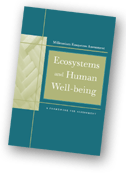Millennium Ecosystem Assessment Releases First Report
Tuesday, September 23, 2003 | Washington, DC, US

The Millennium Ecosystem Assessment (MA), the most extensive study ever of the linkages between the world’s ecosystems and human well-being, today released its first report, Ecosystems and Human Well-being.
The 245-page report lays out the approaches, assumptions, processes, and parameters scientists are using in the study. It offers decision-makers a mechanism to identify options that can better achieve core human development and sustainability goals and better understand the trade-offs in decisions about development and the environment.
“The Millennium Ecosystem Assessment brings together state of the art natural and social science to bear on the needs of decision-makers concerning the links between ecosystems, human development, and sustainability,” said Dr. Robert Watson, co-chair of the MA and chief scientists of The World Bank. “It will help them understand the multiple effects on an ecosystem of any management or policy change.”
The goal of the Millennium Ecosystem Assessment is to establish the scientific basis for actions needed to enhance the contribution of ecosystems to human well-being without undermining their long-term productivity. Its research results will be published starting late 2004 in a series of four in-depth reports and up to seven shorter studies intended for decision-makers in government, the private sector, and civil society groups.
The other volumes will report on the conditions of Earth’s ecosystems, describe plausible scenarios of ecosystem change and human well-being, and provide examples of responses to ecosystem changes and how to avoid them. Another volume will look at how these three topics are treated at a variety of scales from villages to regional watersheds in different assessments being undertaken around the world as part of the MA. Five additional reports will address biodiversity, desertification, wetlands, and the importance of ecosystems for human well-being, and the private sector.
Some 500 scientists from 70 countries are working on these reports, and hundreds more will provide expert review of the assessment. Dozens of institutions throughout the world are contributing their expertise and supporting an on-going dialogue between the scientists and decision makers.
The studies will be published by the MA through Island Press. All the findings will also be available through the MA’s website, www.maweb.org.
The Millennium Ecosystem Assessment (MA) is a 4-year, $21 million effort. It was designed by a partnership of UN agencies, international scientific organizations, and development agencies, with guidance from private sector and civil society groups. Major funding is provided by the Global Environment Facility, the United Nations Foundation, the David and Lucile Packard Foundation, and The World Bank. The MA Secretariat is coordinated by the United Nations Environment Programme (UNEP).
The MA has been recognized by governments as a mechanism to meet part of the assessment needs of four international environmental treaties – the UN Convention on Biological Diversity, the Ramsar Convention on Wetlands, the UN Convention to Combat Desertification, and the Convention on Migratory Species. Twenty-two of the world’s leading scientific bodies, including the Royal Society of the UK and the Third World Academy of Sciences, have pledged to ensure the quality of the reports and assist in its outreach to policy-makers.
The MA’s work is overseen by a 45-member board, co-chaired by Dr. Robert Watson, chief scientist of The World Bank, and Dr. A. H. Zakri, director of the United Nations University’s Institute of Advanced Studies. The Assessment Panel, which oversees the technical work of the MA, includes 13 of the world’s leading social and natural scientists. It is co-chaired by Angela Cropper of the Cropper Foundation, and Dr. Harold Mooney of Stanford University. Dr. Walter Reid is the director of the Millennium Assessment.